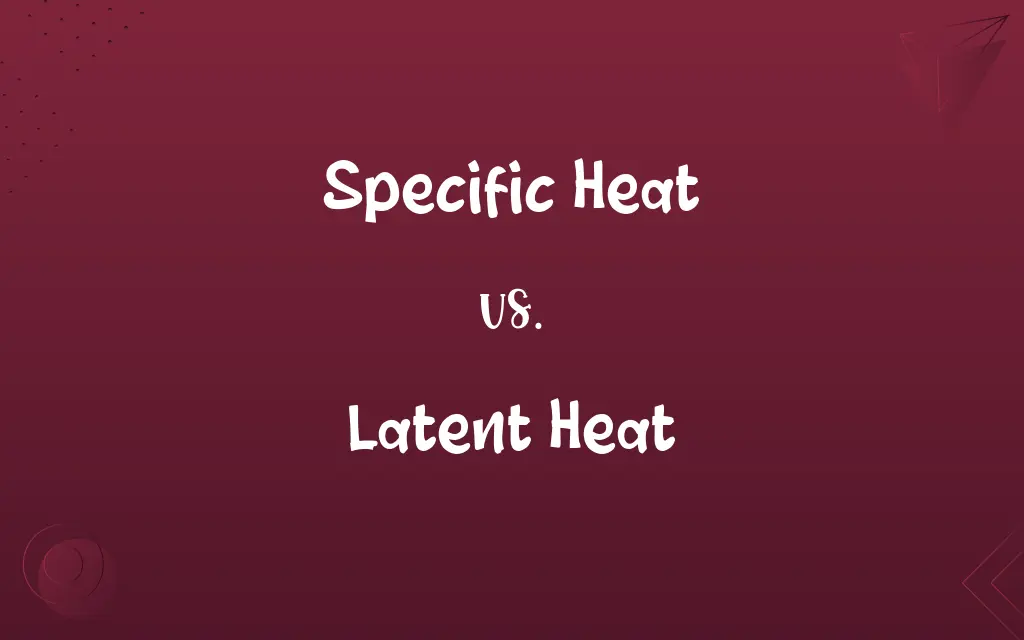Specific Heat vs. Latent Heat: Know the Difference

By Shumaila Saeed || Updated on February 20, 2024
Specific Heat is the amount of heat per unit mass required to raise the temperature by one degree Celsius. Latent Heat is the heat required to convert a substance from one phase to another without a change in temperature.

Key Differences
Specific Heat refers to the heat capacity of a material per unit mass, which quantifies the amount of heat required to raise the temperature of the substance by one degree Celsius. In contrast, Latent Heat is the heat absorbed or released during a phase change of a substance, like melting or boiling, at a constant temperature and pressure. The focus of Specific Heat is temperature change in a single phase, while Latent Heat involves phase transitions without temperature change.
Shumaila Saeed
Feb 19, 2024
In the context of Specific Heat, the energy absorbed increases the kinetic energy of the particles, thereby increasing the temperature. However, in Latent Heat, the energy absorbed or released is used for breaking or forming intermolecular bonds during phase changes, like solid to liquid or liquid to gas, without affecting the temperature. Specific Heat reflects a temperature change in a single state, whereas Latent Heat represents energy change during a state transition.
Shumaila Saeed
Feb 19, 2024
Specific Heat is measured in units like joules per kilogram per degree Celsius (J/kg°C) and reflects the thermal inertia of a material. Latent Heat, on the other hand, is measured in joules per kilogram (J/kg) and indicates the energy required for phase change. Specific Heat varies with temperature and pressure, whereas Latent Heat is characteristic of the type of phase change occurring.
Shumaila Saeed
Feb 19, 2024
In thermodynamics, Specific Heat plays a critical role in understanding how much heat a substance can store and how it responds to temperature changes. Latent Heat is crucial for understanding the energy exchanges during phase transitions, important in processes like refrigeration, heating, and the formation of natural phenomena like rain. Specific Heat deals with temperature variation in a single phase, while Latent Heat is vital for phase transition processes.
Shumaila Saeed
Feb 19, 2024
Specific Heat is a key concept in designing heating and cooling systems, as it helps determine how much energy is needed to change the temperature of different materials. Latent Heat is essential in meteorology, climate science, and various industrial processes like distillation and power generation. Specific Heat affects temperature control strategies, whereas Latent Heat is crucial in phase change management.
Shumaila Saeed
Feb 19, 2024
ADVERTISEMENT
Comparison Chart
Definition
Heat capacity per unit mass for temperature change
Heat for phase change at constant temperature
Shumaila Saeed
Feb 19, 2024
Energy Impact
Alters kinetic energy, changes temperature
Changes bond energy, no temperature change
Shumaila Saeed
Feb 19, 2024
Measurement Focus
Heat required for temperature change
Heat involved in phase transition
Shumaila Saeed
Feb 19, 2024
Applications
Heating/cooling systems, material science
Meteorology, refrigeration, industrial processes
Shumaila Saeed
Feb 19, 2024
ADVERTISEMENT
Specific Heat and Latent Heat Definitions
Specific Heat
Specific Heat measures how much energy a substance can absorb before increasing in temperature.
Water has a high Specific Heat, requiring more energy to increase its temperature compared to other substances.
Shumaila Saeed
Jan 25, 2024
Latent Heat
Latent Heat quantifies the heat involved in transitions like melting, freezing, or boiling.
Boiling water involves absorbing Latent Heat to turn liquid water into steam at the same temperature.
Shumaila Saeed
Jan 25, 2024
Specific Heat
Specific Heat is the amount of energy needed to raise the temperature of one kilogram of a substance by one degree Celsius.
Sand has a lower Specific Heat than water, so it heats up and cools down more quickly.
Shumaila Saeed
Jan 25, 2024
Latent Heat
Latent Heat is the 'hidden' heat that causes phase changes in substances at constant temperature.
Condensation of steam releases Latent Heat but the steam's temperature remains constant.
Shumaila Saeed
Jan 25, 2024
Specific Heat
Specific Heat reflects the thermal inertia of a substance, showing how it responds to heat.
A substance with a high Specific Heat takes longer to heat up, acting as a thermal buffer.
Shumaila Saeed
Jan 25, 2024
ADVERTISEMENT
Latent Heat
Latent Heat is the energy absorbed or released by a substance during a phase change without temperature change.
The melting of ice absorbs Latent Heat but does not change the temperature of the ice-water mixture.
Shumaila Saeed
Jan 25, 2024
Specific Heat
Specific Heat indicates a material's resistance to temperature change when heat is applied.
Due to its high Specific Heat, water heats up slower than metal under the same heat source.
Shumaila Saeed
Jan 25, 2024
Latent Heat
Latent Heat is involved in breaking or forming molecular bonds during phase changes.
The Latent Heat of vaporization is the energy required to break the bonds in liquid water to form steam.
Shumaila Saeed
Jan 25, 2024
Specific Heat
Specific Heat, often measured at constant pressure, reveals how much heat a substance can hold.
The high Specific Heat of the ocean helps regulate Earth's climate by absorbing large amounts of heat.
Shumaila Saeed
Jan 25, 2024
Latent Heat
Latent Heat reflects the heat absorbed or released at a constant temperature during phase change.
The freezing of water releases Latent Heat but the temperature of the water remains at 0°C.
Shumaila Saeed
Jan 25, 2024
Repeatedly Asked Queries
What is Latent Heat?
Latent Heat is the heat absorbed or released by a substance during a phase change at a constant temperature.
Shumaila Saeed
Feb 19, 2024
What is Specific Heat?
Specific Heat is the heat required to raise the temperature of a unit mass of a substance by one degree Celsius.
Shumaila Saeed
Feb 19, 2024
What are some examples of high Specific Heat substances?
Water is a common example, known for its high Specific Heat.
Shumaila Saeed
Feb 19, 2024
How are Specific Heat and Latent Heat different?
Specific Heat relates to temperature change in a single phase, while Latent Heat involves heat exchange during phase transitions without temperature change.
Shumaila Saeed
Feb 19, 2024
Does Specific Heat apply to gases?
Yes, gases also have Specific Heat, which can be measured at constant volume or pressure.
Shumaila Saeed
Feb 19, 2024
What role does Latent Heat play in nature?
Latent Heat is crucial in natural processes like the water cycle, where it influences evaporation and condensation.
Shumaila Saeed
Feb 19, 2024
What is the Latent Heat of fusion?
Latent Heat of fusion is the heat required to change a substance from solid to liquid at its melting point.
Shumaila Saeed
Feb 19, 2024
What factors affect Specific Heat?
Factors include temperature, pressure, and the material's physical state.
Shumaila Saeed
Feb 19, 2024
Why is Specific Heat important?
Specific Heat is important for understanding how substances respond to heat and for designing heating and cooling systems.
Shumaila Saeed
Feb 19, 2024
How is Latent Heat used in refrigeration?
In refrigeration, Latent Heat is used to absorb heat as the refrigerant changes phase, cooling the surroundings.
Shumaila Saeed
Feb 19, 2024
How is Latent Heat measured?
Latent Heat is typically measured in joules per kilogram (J/kg).
Shumaila Saeed
Feb 19, 2024
Can Specific Heat vary with temperature?
Yes, Specific Heat can vary with temperature and the state of the material.
Shumaila Saeed
Feb 19, 2024
Is Latent Heat always the same for a given substance?
Latent Heat is specific to the type of phase change (e.g., melting, vaporization) and is usually constant for a given substance under the same conditions.
Shumaila Saeed
Feb 19, 2024
How do Specific Heat and thermal conductivity relate?
While Specific Heat measures heat capacity, thermal conductivity measures how quickly heat is transferred through a material.
Shumaila Saeed
Feb 19, 2024
How do engineers use Specific Heat in design?
Engineers use Specific Heat to calculate heating and cooling requirements in various applications.
Shumaila Saeed
Feb 19, 2024
Can we feel Latent Heat?
While we don't feel a temperature change, the effects of Latent Heat absorption or release can be observed in phase changes.
Shumaila Saeed
Feb 19, 2024
Are Latent Heat and Sensible Heat the same?
No, Sensible Heat involves a temperature change, while Latent Heat does not change temperature during phase transitions.
Shumaila Saeed
Feb 19, 2024
Does Specific Heat change with phase?
Yes, Specific Heat can vary significantly between solid, liquid, and gaseous phases of a substance.
Shumaila Saeed
Feb 19, 2024
What is the Latent Heat of vaporization?
Latent Heat of vaporization is the heat required to convert a liquid into a gas at its boiling point.
Shumaila Saeed
Feb 19, 2024
What happens to Latent Heat during condensation?
During condensation, Latent Heat is released as a gas changes to a liquid.
Shumaila Saeed
Feb 19, 2024
Share this page
Link for your blog / website
HTML
Link to share via messenger
About Author
Written by
Shumaila SaeedShumaila Saeed, an expert content creator with 6 years of experience, specializes in distilling complex topics into easily digestible comparisons, shining a light on the nuances that both inform and educate readers with clarity and accuracy.









































































